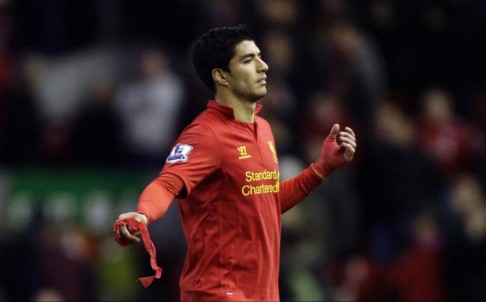Rational ref: diving an art or cheating
While some players consider falling over to be cheating, others consider it a skill of the game
Liverpool's Luis Suarez has a reputation for going to ground easily. Photo: AP
To dive or not to dive, that is the question professional players have to ponder, particularly when prowling the penalty area. Diving, which match officials call simulation, is pretending to be fouled in an attempt to deceive the referee to gain a favourable decision. Some consider this to be cheating, while others believe it to be a useful skill.
Players with a reputation for going to ground easily include Liverpool's Uruguayan Luis Suarez, Manchester City's Argentinean Sergio Aguero and Manchester United's Ecuadorian Antonio Valencia. These high-profile foreign players contribute to the stereotype of "that type of player" who cheats.
Simulation came to be due to two broad schools of soccer culture. The first recognises committed, hard-grafting physical players and the other appreciates elegant, more-accomplished skilful players. The latter, being technically gifted and sometimes breathtaking to watch, are usually prone to being taken down a peg or two by the former.
Nobody likes to be publicly embarrassed by a piece of skill so those who are victims overcompensate for their insecurities by "mowing down" whoever they consider to be "show ponies". The flip side of this is that skilful players resent being kicked and physically intimidated and, as a matter of survival, learn the benefits of falling easily. It's an ongoing battle between players of differing skill levels, and keeps officials on their toes.
In last week's Merseyside derby (28 October 2012), the pre-match hype was focused on Suarez's habit of diving but ironically it was Englishman and Everton captain Phil Neville who was booked - correctly - for simulation, with Suarez's overall performance earning him man of the match.
Even so, some players believe it is their right to cheat. Aguero, without a hint of conscience, shifted the responsibility from players to match officials by saying: "We just play our game, and it's the referee's job to know who is tricking him and who is not." So, faced with players who cheat, the blame unfairly lies with referees for failing to detect divers. This is like saying shoplifting is acceptable providing one can get away with it.
If a player dives and succeeds, the most he can "steal" is a penalty plus a straight red card for his opponent. If a player dives and is caught, the most he loses is a yellow card. However, if he is already on a caution the risk is greater. This happened to Chelsea's £50 million (HK$623 million) striker Fernando Torres last weekend. He was sent off for receiving a second caution after referee Mark Clattenburg determined he dived against Manchester United.
Truth be told, Torres went down easily. Even though he had "nutmegged" his opponent, Jonathan Evans, the ball was already running away from him and covering defender Rio Ferdinand would have cleared the danger. Therefore, it was easier for Torres to "trawl" for a foul and go down.
"I'd say 75 per cent of people could stay on their feet, and if they get touched and go down it is almost, 'Hey, I got touched so it's OK to go down'," says ex-England striker Michael Owen.
Owen was honest enough to admit, in front of ex-referee Pierluigi Collina, that he could have stayed on his feet when he won crucial penalties against Argentina in the 1998 and 2002 World Cups.
Coaches are just as culpable as players who dive. It is accepted knowledge that former England manager Glenn Hoddle advised a young Owen to fall more often. "Sometimes Michael is too honest", said Hoddle in 1998 when he gave Owen his England debut at the age of 18.
In fact, young players naturally stay on their feet even though they are hacked, knocked and kicked about. The spirit and innocence of youth mean they just want to get on with playing without the theatre. With experience, cynicism and increasingly injury-prone bodies, the opportunity for ageing players to go down becomes ever tempting. Cue Neville.
It is this endearing youthful feature that suggests Lionel Messi is perhaps a better player than Cristiano Ronaldo. For the past year, both have been in imperious form, which has led many observers to claim it to be impossible to separate the two for the 2012 Fifa Ballon d'Or.
However, there is one noteworthy distinction. When tackled, Ronaldo tends to go down easily, while Messi chooses to ride the challenge and continue playing. By not complaining or cheating, Messi can claim the moral high ground because he is among the 25 per cent of players who stay on their feet.
Shakespeare would be proud: "The spurns that patient merit of th'unworthy takes."
This article appeared in the South China Morning Post print edition as To dive, or not to dive … that is the burning question
PUBLISHED : Friday, 02 November, 2012










No comments:
Post a Comment